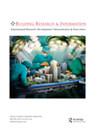How prebound effects compromise the market premium for energy efficiency in German house sales
IF 3.7
3区 工程技术
Q1 CONSTRUCTION & BUILDING TECHNOLOGY
引用次数: 5
Abstract
ABSTRACT Recent studies indicate that houses with higher energy efficiency usually have higher market prices, a ‘market premium for energy efficiency’. But in Germany the usefulness of this premium is confounded by the ‘prebound effect’: the gap between officially certificated energy ratings and actual energy consumption. Attempts have been made to close this gap from two complementary directions: downwards, by obtaining more accurate and less pessimistic technical estimates of idealised energy performance; and upwards, by estimating how much energy occupants realistically need for health and comfort. This study investigates prebound effects alongside an analysis of house prices in Germany, using a large database of house sale advertisements from 2007 to 2021, focusing on pre-1980 homes that were re-sold in 2019–2021. It uses ordinary least-squared multivariate regression to estimate market premiums for energy efficiency and sets these alongside estimates of prebound (and rebound) effects. It finds that prebound effects can lead purchasers to overestimate future energy savings and therefore pay more for properties than their actual worth. It also offers simple models to help purchasers interpret energy ratings more critically and estimate likely energy savings more realistically. Finally, it suggests how policymakers could modify energy ratings to reflect likely energy consumption more accurately.捆绑前效应如何损害德国房屋销售中能源效率的市场溢价
摘要最近的研究表明,能效较高的房屋通常具有较高的市场价格,即“能效市场溢价”。但在德国,这种溢价的有用性被“预绑定效应”所混淆:官方认证的能源评级与实际能源消耗之间的差距。人们试图从两个互补的方向来缩小这一差距:向下,通过获得理想化能源性能的更准确和不那么悲观的技术估计;通过估计居住者实际需要多少能量来获得健康和舒适。这项研究使用2007年至2021年的大型房屋销售广告数据库,调查了预绑定效应,并对德国的房价进行了分析,重点关注了2019年至2021年间转售的1980年前的房屋。它使用普通最小二乘多元回归来估计能源效率的市场溢价,并将其与预绑定(和反弹)效应的估计值一起设置。研究发现,预绑定效应会导致购买者高估未来的能源节约,从而为房产支付比实际价值更多的费用。它还提供了简单的模型,帮助购买者更准确地解释能源评级,并更真实地估计可能的能源节约。最后,它建议政策制定者如何修改能源评级,以更准确地反映可能的能源消耗。
本文章由计算机程序翻译,如有差异,请以英文原文为准。
求助全文
约1分钟内获得全文
求助全文
来源期刊

Building Research and Information
工程技术-结构与建筑技术
CiteScore
8.60
自引率
7.70%
发文量
43
审稿时长
>12 weeks
期刊介绍:
BUILDING RESEARCH & INFORMATION (BRI) is a leading international refereed journal focussed on buildings and their supporting systems. Unique to BRI is a focus on a holistic, transdisciplinary approach to buildings and the complexity of issues involving the built environment with other systems over the course of their life: planning, briefing, design, construction, occupation and use, property exchange and evaluation, maintenance, alteration and end of life. Published articles provide conceptual and evidence-based approaches which reflect the complexity and linkages between cultural, environmental, economic, social, organisational, quality of life, health, well-being, design and engineering of the built environment.
 求助内容:
求助内容: 应助结果提醒方式:
应助结果提醒方式:


